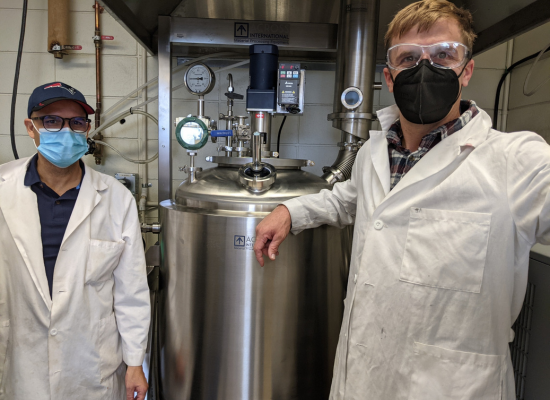The following article is from CHEManager. Find the original here.
The American start-up Zila Bioworks is transforming hard-tech manufacturing with drastically cleaner, greener chemistry, while supporting rural communities.


The following article is from CHEManager. Find the original here.
The American start-up Zila Bioworks is transforming hard-tech manufacturing with drastically cleaner, greener chemistry, while supporting rural communities.

Epoxy resins are a type of industrial plastic used in fibre-reinforced composites, coatings, and adhesives. Zila uses vegetable oils, like hempseed and linseed oil, to create a high-performance, drop-in bio-epoxy replacement for a number of different applications. Not only does Zila drastically reduce the carbon footprint of epoxies, their technology also enables recyclability of epoxy composites. Zila formulates its bio-epoxy resin systems, making it an attractive drop-in solution for manufacturers. For these reasons, Zila Bioworks has been chosen as the Start-up of the Month for May 2024 by the International Sustainable Chemistry Collaborative Centre (ISC3).
For 80 years the chemical industry has been using petroleum-based bisphenol A (BPA) as the backbone of epoxies and other plastics. According to Jason (CEO & Co-founder), these epoxies create a very heavy carbon footprint – over five kilogrammes of CO2 per kilogramme of epoxy produced and the epoxy itself is not recyclable either. The few bio-based epoxy competitors in the market are still using BPA as the backbone, however, combine it with a bio-epichlorohydrin to give them about 30 percent bio content and a 14 percent reduction in carbon footprint. Zila's patent technology doubles the bio content and has the potential to cut the embodied carbon in half compared to their nearest competitor without losing performance. Traditional vegetable oil-based epoxies do exist on the market and are produced at scale, but lack in performance, especially for industrial composites.
The inherent structure of the polymers (which epoxies are) includes so called dynamic covalent bonds. This “vitrimer” technology allows for a recyclability of epoxies and other materials used in epoxy composite applications, making it attractive for the sustainable chemistry industry. Zila’s formulated epoxy resin systems are designed in a way that it is easy for manufacturers to substitute traditional, petroleum-based plastics, without having to adopt a new production technology.
Zila mostly focuses on hempseed oil as a bio-feedstock. Hemp is a carbon sequestering renewable resource. As a multi-use crop, hemp is beneficial to farmers, soil, ecosystem health, and rural communities. Zila’s use of hempseed oil as a bio feedstock reduces the carbon footprint of their bio-epoxy. So, through full crop utilisation it can be more equitable for farmers upstream, adding to regenerative agriculture and sustainable land use, all important as part of the circular economy approach of the innovation.
The whole success story of the ISC3 Start-up of the Month in May 2024 is currently told by the ISC3 on its website at Start-up Zila Bioworks (isc3.org).
What led to your solution in Sustainable Chemistry?
Jason Puracal:We recognized that we, as a society, need to shift away from extractive resources to renewable resources and there's a market opportunity coming in the United States with the eventual legalisation of industrial hemp. And so, for the first five years of the endeavour, we were simply doing market analysis trying to figure out what's the highest value-added product we could produce from the highest value part of the hemp crop. Consequently, we took the seed oil and went through a patented process to produce a bio epoxy resin the highest class of thermal set plastic we use as a society. We continue to focus on hemp because of the carbon sequestration nature of the crop and it´s multiple parts of the of crop that have market value.
What does being chosen as ISC3 Start-up of the Month mean to you?
J. Puracal:We greatly appreciate the support from ISC3. We continue to get validation from the marketplace: Like recently we won the JEC world startup booster competition in the product's materials category in Paris last month. ISC3 has such a detailed focus specifically in sustainable chemistry and brings recognition to the challenge that we're working on and that the latter has value in the marketplace. We need more companies to be solving this kind of embodied carbon legacy industry challenges.
What’s next up at Zila Bioworks?
J. Puracal:The start-up has not only proven viability in certain market applications, but continues to be bombarded by the marketplace with requests for their technology including automotive, aerospace, food & beverage can linings, EV battery adhesives, wood engineered products, paints, et cetera. Zila is currently focusing on the step of scaling up production and already has proposals of potential pilot toll manufacturers. They are hoping to scale up 1 tonne of material by the end of the summer to do limited production runs with customers in the outdoor industry. This will lead to first commercial volume purchase orders. Additionally, the pilot production work in front of them will complete their tech package with safety.